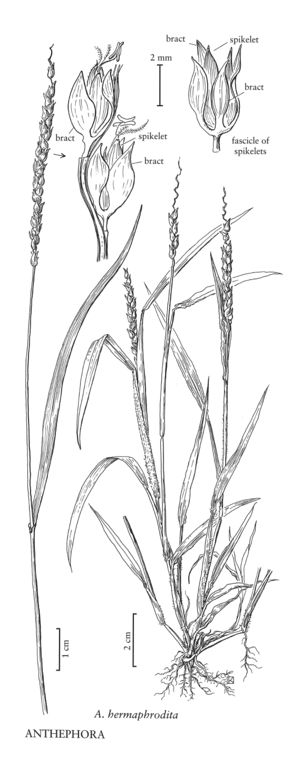| Taxon | Illustrator ⠉ | |
|---|---|---|
 | Anthephora hermaphrodita | Karen Klitz Linda A. Vorobik |
Plants annual or perennial; tufted or cespitose. Culms 15-50 cm, not woody. Sheaths open; ligules membranous. Inflorescences terminal, spikelike panicles, each node supporting a highly reduced branch or fascicle of spikelets; fascicles imbricate, with a short, thick, basal stipe sub¬tending 4 thick, rigid, coriaceous, many-veined, flat, narrowly elliptic to ovate bracts; bracts fused at the base, enclosing 2-11 spikelets, 1-2 of the spikelets sterile or reduced; disarticula¬tion beneath the fascicles. Spikelets with 2 florets. Lower glumes absent; upper glumes acicular, 1-veined, awned; lower florets sterile, sometimes reduced; lower lemmas 7-veined; lower paleas subequal to the lower lemmas; upper florets bisexual, sterile, or reduced; upper lemmas faintly 3-veined. Caryopses ellipsoidal, x = 9.
Distribution
Puerto Rico, Virgin Islands, Pacific Islands (Hawaii), Fla.
Discussion
Anthephora is a genus of 12 species. Most of the species are native to Africa and Arabia. One species is native to tropical America and has become established in the Flora region.
The fascicle bracts are often interpreted as the lower glumes of the spikelets, but the devel¬opmental studies needed to evaluate this interpretation have not been conducted.
Selected References
Lower Taxa
"thick" is not a number."decumbent" is not a number.